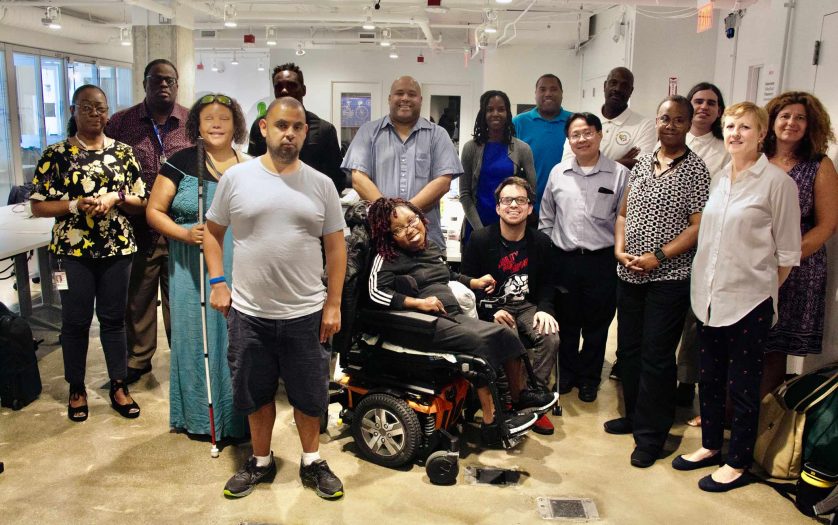Starting a business as a person with disability while navigating systemic obstacles

Starting a business is far from easy, but for many People with Disabilities, it is a necessary way to engage in meaningful work, as the employment gap for disabled individuals remains unacceptably wide: according to the U.S. Bureau of Labor Statistics in 2021, just 19.1 percent of Persons with a Disabilities were employed, compared to 63.7 percent of persons without a Disability. And even once a person with a Disability is hired, there are all sorts of challenges they must navigate with regards to accessibility, career growth and of course, the outdated practice permitting sub-minimum wages.
So what are some best practices for Entrepreneurs with Disabilities, as well as steps these individuals can take to scale their businesses while also setting the stage for inclusive workplace environments? The answers to these complex questions are more straightforward than you may think.
Do a quick internet search and you’ll find hundreds of resources and guides on the logistics of launching a business, including how to write a business plan, the importance of researching your target audience and competitors, not to mention an array of financial information. But the factor that these guides and resources all have in common is that they each demonstrate the importance of support, partnerships and other types of collaboration. No person is an island, especially when they’re a business founder. And for entrepreneurs with disabilities, they should expect to encounter a range of additional obstacles, especially with regards to venue and material accessibility.
However, these obstacles can be navigated so much more smoothly when founders connect with mentors, startup accelerators and other types of community-minded business organizations that are doing meaningful work all over the country, both virtually and in-person. 2Gether-International is a great example of this,
In addition, joining community and business development organizations can also provide crucial networking opportunities that can help address another common set of obstacles faced by overlooked communities: access to capital to fund and scale. A massive obstacle Disabled Founders face is access to capital, as is the case for all underestimated entrepreneurs. Women, Black, and Latino entrepreneurs each receive less than 3% of venture capital funding. However, with regards to disabled entrepreneurs, the funding data is not even available. Prior to initiatives like 2Gether-International’s Cohort Accelerators, tech cohorts that focused exclusively on Founders with Disabilities simply did not exist. And according to the National Disability Institute, many venture capitalists won’t find themselves even considering Disabled Founders because the Census Bureau does not retain data for this community.
It is also worth noting that backing companies run by Disabled Founders is not just an initiative to add to one’s philanthropic or DEI bucket list. There is a strong, proven ROI, making this an overall wise economic decision. A study completed by the World Bank in the year 2000 estimated that between $1.37 and $1.94 trillion in global GDP is lost each year because of the limited involvement of disabled people in our economy. Plus, a 2018 Accenture figure determined that firms that prioritized investment in improving their Disability inclusion strategies improved total shareholder returns by 53%.
Once a business is up and running, each founder has the opportunity to create an inclusive and empowering workplace environment that gives equal opportunities to employees with disabilities. There are several actually actionable ways business owners and managers can improve their recruitment and retention of employees with disabilities. With regards to the hiring process, increasing accessibility can be as simple as ensuring all company materials and job postings are accessible (or are modified for different communities) and use Universal Design standards, and utilizing accessible technology platforms (such as Google Meet). Once people with disabilities are on the job, flexible workplace accommodations and mentorship programs are great practices, plus implementing company-wide inclusivity training.
Entrepreneurship is an actionable path that people with disabilities can take to collectively close the employment gap, while setting the stage (and setting examples) for more inclusive and empowering workplace environments. And fortunately, thanks to like minded community organizations and programs, founders no longer need to embark on their journeys alone.
Featured Stories
-
 I finally got hearing aids at age 26, after a lifetime of feeling stigmatized
I finally got hearing aids at age 26, after a lifetime of feeling stigmatized
-
 Preparing for the parenting life when you have a disability
Preparing for the parenting life when you have a disability
-
 4 fun cities to visit on your self-care reset trip
4 fun cities to visit on your self-care reset trip
-
 How to manage an ADHD diagnosis
How to manage an ADHD diagnosis
-
 Is the United States facing a shortage of nursing homes for people with disabilities?
Is the United States facing a shortage of nursing homes for people with disabilities?


